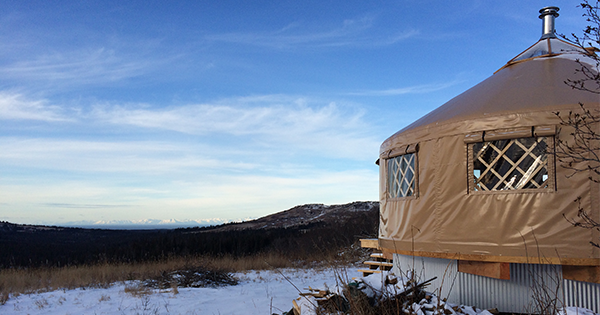
You might not think that in a town of about 5,000 at the end of the road in Alaska, where we just got our third traffic signal (a blinking red light), there is an urge to get away from it all. But there is—at least for my husband and me. We recently bought nine acres of land at the end of a road you can’t drive for most of the year. The parcel is square, bordered on two sides by public land, and is a three-quarter-mile walk or bike ride or ski from a gravel parking pad. If we’re hiking in at an adult clip, it takes an hour to get there from our house, door to door.
Although when we bought the land, there was no door. We recently put up a 24-foot yurt fabricated by a local business on a platform the previous owner built out of rough-cut spruce. From the deck of the yurt, we can see no houses, just down a valley tangled by willows, along hillsides pimpled by hummocks, over stands of spruce, to the jagged peaks of the Alaska Range which rise up 60 miles or so to the west, across Cook Inlet.
There’s no electricity on the property. Toilet facilities are currently a hole in the ground. We have to bring in water. The only amenity is a wood stove we installed in the yurt. Last weekend we lit the first of three fires—a low-temperature burn—needed, according to the stove’s instructions, for proper break-in. It didn’t particularly warm us up as we sat on the yurt’s dirty plywood floor and ate a lunch of bread, cheese, and apples with our daughters. But as we sat there, plates of snow slid off the roof of the yurt, making a zipping noise the girls found exciting. And the sun was shining outside as we stacked firewood in the dry space under the yurt and the girls made snow angels on the deck. So it didn’t much matter.
But this simple life is already feeling a bit complicated. The local snowmachine group wants an easement to zoom across the corner of our property to access the public land beyond it. We’re in a muddle over how to furnish a round space with square furniture. We wonder how we will respond when our daughters refuse the trek in, away from friends and the activities of town. And what if the snow we’re counting on in order to enjoy this winter getaway—the snow we haven’t seen in two years—never returns?
It’s a wager we’re making by setting up this place—a wager that, on winter weekends, it will still feel peaceful despite the whine of snowmachines from nearby hills. It’s a wager that, somehow, coming out here will become a family ritual the girls will come to enjoy and remember fondly. We’re hoping that friends will make the trip too, and we’ll all be together flipping pancakes on a two-burner propane stove some Sunday morning after a pile-on sleepover with a bunch of kids stuffed into the loft we plan to build in the yurt. We’re betting on real winter returning, on being able to ski over willows smoothed by half a dozen feet of snow into the valley where wolves occasionally leave tracks. Some days the odds feel long, but I’m in.

